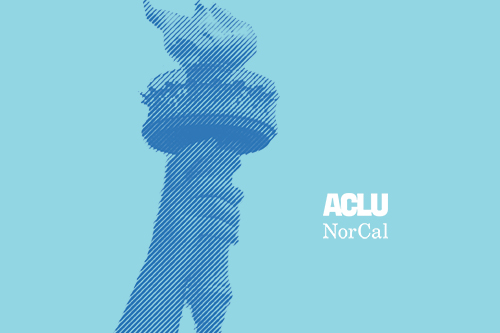Article Media


The ACLU Foundation of Northern California filed a lawsuit against the City and County of San Francisco and San Francisco Police Chief Gregory Suhr on March 20, 2013 challenging the warrantless searches of cell phones of individuals who have been arrested. The suit was brought on behalf of a civil rights activist, Bob Offer-Westort, whose cell phone was searched by the San Francisco Police Department without a warrant after he was arrested for engaging in peaceful civil disobedience.
This week a federal judge ordered a bond hearing for a woman who has been detained without due process by U.S. Immigration and Customs Enforcement (ICE) for nearly a year and a half. Bertha Mejia, a grandmother with deep family ties in California and with no violent criminal history, was classified by ICE as a "mandatory detainee" because of misdemeanor convictions for stealing groceries.
On Feb. 6, 2013 the ACLU Foundation of Northern California, along with Bertha Mejia Espinoza's immigration attorney Rosy Cho, filed a petition for a writ of habeas corpus, seeking Ms. Mejia's release from Yuba County Jail.
On the basis of minor, nonviolent offenses primarily petty theft of food items, the Bureau of Immigration and Customs Enforcement of the Department of Homeland Security (ICE) has classified Ms. Mejia as a "criminal alien" who must be detained for the duration of her immigration proceedings without the possibility of release on bond.

When it comes to drugs, we should focus on the goals we agree on: protecting our kids, protecting public safety and preventing and treating drug abuse and addiction.
That's why the ACLU of California is supporting legislation authored by Sen. Mark Leno (D-San Francisco) to reform California's harsh drug possession penalties, so that we can help set people up for success rather than failure in overcoming a drug problem and returning to the community.

Sacramento – Sen. Mark Leno has introduced new legislation, sponsored by the American Civil Liberties Union of California and a mber of other organizations, that reforms California’s drug sentencing laws for simple possession.
Did you know that Google Play, the company's app store for Android users, sends sensitive information to app developers every time you purchase an app?
These days, more and more people turn to the Internet to find true love – and in the process share some of their most personal information with companies looking to act as matchmakers. And while the ACLU may not help you find your soulmate on Valentine's Day, the latest edition of Privacy and Free Speech: It's Good for Business, our guide for companies, can help online dating services and other companies protect that private data and avoid a bad breakup with their users.
Last year was jam-packed with stories of companies making costly mistakes on user privacy and free speech. To help companies get a fresh start in 2013, the ACLU of California has just released the new edition of Privacy and Free Speech: It's Good for Business.
This primer (and companion website) is a practical, how-to guide illustrating how businesses can build privacy and free speech protections into their products and services – and what can happen if they don't.